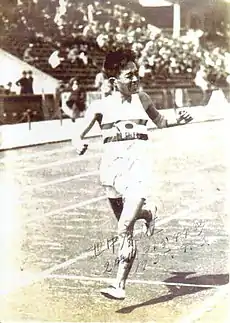 Yasuo Ikenaka at finish line of the Berlin Olympic trials on April 3, 1935 in Tokyo, Japan. | |
| Personal information | |
|---|---|
| Born | March 25, 1914 Nakatsu, Ōita, Japan |
| Died | March 14, 1992 (aged 77) |
| Sport | |
| Country | Japan |
| Sport | Long-distance running |
| Event | Marathon |
| Club | Toyo University |
| Achievements and titles | |
| Personal best |
|
Yasuo Ikenaka (池中 康雄, Ikenaka Yasuo, March 1914 - March 14, 1992[nb 1])[5] was a Japanese long-distance runner who is credited by the International Association of Athletics Federations for setting a world's best in the marathon on April 3, 1935.[6] According to the IAAF, Ikenaka's time of 2:26:44 was over a minute faster than the previous record set by Fusashige Suzuki three days earlier.[6][nb 2]
Notes
- ↑ Records from the Association of Road Racing Statisticians notes birthday as either March 3, 1914[1] or March 25, 1914.[2][3] According to his obituary he died at 77 on March 14, 1992, which means his date of birth cannot be earlier than March 15, 1914.[4]
- ↑ Although the International Association of Athletics Federations notes the date as March 31, 1935, the Association of Road Racing Statisticians shows that Fusashige Suzuki's 2:27:49 performance occurred in Tokyo on March 21, 1935 during a race in which he finished second to Sohn Kee-chung (sometimes referred to as Kee-Jung Sohn or Son Kitei) who ran a 2:26:14.[2]
References
- ↑ "World Marathon Rankings for 1932". Association of Road Racing Statisticians. Retrieved 2010-05-14.
- 1 2 "World Marathon Rankings for 1935". Association of Road Racing Statisticians. Retrieved 2010-05-14.
- ↑ "World Marathon Rankings for 1936". Association of Road Racing Statisticians. Retrieved 2010-05-14.
- ↑ Yomiuri Shimbun. Tokyo. March 15, 1992. p. 31.
{{cite news}}: Missing or empty|title=(help) - ↑ 池中康雄顕彰碑の除幕式が開催されました
- 1 2 "12th IAAF World Championships In Athletics: IAAF Statistics Handbook. Berlin 2009" (PDF). Monte Carlo: IAAF Media & Public Relations Department. 2009. p. 565. Retrieved November 4, 2009.
This article is issued from Wikipedia. The text is licensed under Creative Commons - Attribution - Sharealike. Additional terms may apply for the media files.